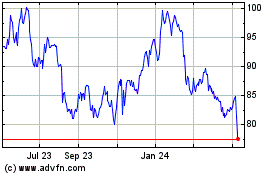Sony, Paramount Try to Get Off the B List -- WSJ
March 18 2017 - 3:02AM
Dow Jones News
By Ben Fritz
As Hollywood's two worst-performing movie studios seek new
leaders, Paramount Pictures and Sony Pictures Entertainment also
face more fundamental questions about how to turn around their
businesses after years of underinvestment by their parent
companies.
Paramount has consistently ranked last at the box office among
Hollywood's six majors studios since 2013 and Sony Pictures has
been No. 5 or No. 4, according to industry data.
Paramount's profits have declined for five straight years, most
recently reaching a loss of $445 million for the fiscal year ended
September. Sony Corp. doesn't report its motion-picture profit
separately from television, but recently took a write-down of
nearly $1 billion at its studio. It also reduced profit projections
for movies after a series of box-office disappointments.
Viacom Inc. abandoned plans to sell 49% of Paramount last year
and Sony has denied rumors it is looking to sell its studio. Both
companies are looking to turn around their movie businesses under
new management, but face formidable challenges, current and former
employees say.
Their struggles illustrate the importance of long-term
investments and strategic acquisitions in the film business at a
time when franchises and recognizable brands generate the biggest
profits. "The movie business has become a story of haves and
have-nots," said Michael Nathanson, senior analyst at
MoffettNathanson Research. "You need to build a good farm system
and then you need to execute."
For instance, Walt Disney Co.'s multibillion-dollar acquisitions
of Pixar Animation Studios, Marvel Entertainment and Lucasfilm LLC
have provided most of the franchises that have helped it dominate
the movie business in recent years. Universal Pictures for years
lingered at the bottom of the box-office rankings until Comcast
Corp. bought it from General Electric Co. in 2011.
The cable company upped annual production spending to about $1.2
billion from $850 million, invested in its consumer-products and
theme-parks businesses and last year bought DreamWorks Animation
SKG Inc. The investments have boosted Universal's profits, and
employees say this has helped improved morale.
Rather than increase spending, new Viacom Chief Executive Bob
Bakish wants the studio to focus on films related to shows and
talent on its cable networks such as MTV and Nickelodeon. Viacom is
currently negotiating with former Fox studio executive Jim
Gianopulos to lead Paramount, according to people familiar with the
matter. "There are significant resources and it will be up to the
studio management to take those resources and produce returns for
shareholders," Mr. Bakish said in an interview.
Sony isn't as close to finding a new CEO for its studio, a
larger job than Paramount as it also includes a television business
in which it has invested. But since Tom Rothman was named head of
Sony Pictures' motion-picture unit in 2015, he has sought to
improve results by increasing the focus on international markets
and trying to bring PlayStation games to the big screen, although
box-office results haven't improved.
"We are confident that the groundwork has been laid for
meaningful, long-term reform," said a Sony Pictures spokesman.
Sony finance chief Kenichiro Yoshida said last month that the
struggles of the Japanese company's studio stem partly from
decisions "to raise short-term cash in exchange for long-term cash
flow when the electronics units were struggling."
He cited the company's decision to sell its 25% interest in the
merchandise rights to Spider-Man to Marvel in 2011. Under the deal,
which also resolved longstanding legal disputes, Marvel made a net
payment of about $180 million, according to documents released in a
corporate hack. Sony still controls film rights to Spider-Man.
Paramount and Sony haven't bought assets to augment their movie
businesses in the past decade. Paramount previously distributed
movies from Marvel and DreamWorks Animation and considered trying
to buy both, employees said. Instead, Marvel and DreamWorks were
acquired by Disney and Comcast, respectively. Sony Pictures
executives discussed buying Metro-Goldwyn-Mayer, whose James Bond
movies Sony had distributed for years. Instead MGM reorganized
itself into an independent venture. Other potential acquisitions
targets for Sony included DreamWorks Animation and pay-cable
network Starz, according to employees. Lions Gate Entertainment
Corp. ended up buying the network.
"There was a cautious business philosophy where we did not want
to take big swings," said a former Sony Pictures executive. Many at
the studio have also expressed frustration at the lack of synergy
with Sony's biggest entertainment asset: the PlayStation. The
company could have used the videogame console's huge global
footprint to launch a Netflix-like streaming service featuring Sony
Pictures content, they note.
Paramount and Sony have at times chosen release dates not based
on what is best for a film, but in order to maximize short-term
profits, employees said. Releasing a movie late in a fiscal year
typically means accounting for tens of millions in marketing
expenses while waiting until the next fiscal year for the revenue
that follows.
Paramount and Sony spend less than $1 billion a year on movie
production, people who have worked at both said, while other
studios spend as much as $1.5 billion. Major "event" movies
typically cost between $100 million and $250 million to make.
That was the reason Paramount, whose fiscal year ends in
September, delayed the Leonardo DiCaprio thriller "Shutter Island"
to February 2010, from October 2009, and why it has released no
movies in August or September for five of the past seven years,
employees said.
"Cutting, cutting, cutting as a way to create the appearance of
wealth was the philosophy here for a long time," said one Paramount
employee.
Paramount and Sony have each made two or three such movies
annually for the past few years, while studios such as Disney and
Universal have made between four and eight such movies.
Write to Ben Fritz at ben.fritz@wsj.com
(END) Dow Jones Newswires
March 18, 2017 02:47 ET (06:47 GMT)
Copyright (c) 2017 Dow Jones & Company, Inc.
Sony (NYSE:SONY)
Historical Stock Chart
From Mar 2024 to Apr 2024

Sony (NYSE:SONY)
Historical Stock Chart
From Apr 2023 to Apr 2024
